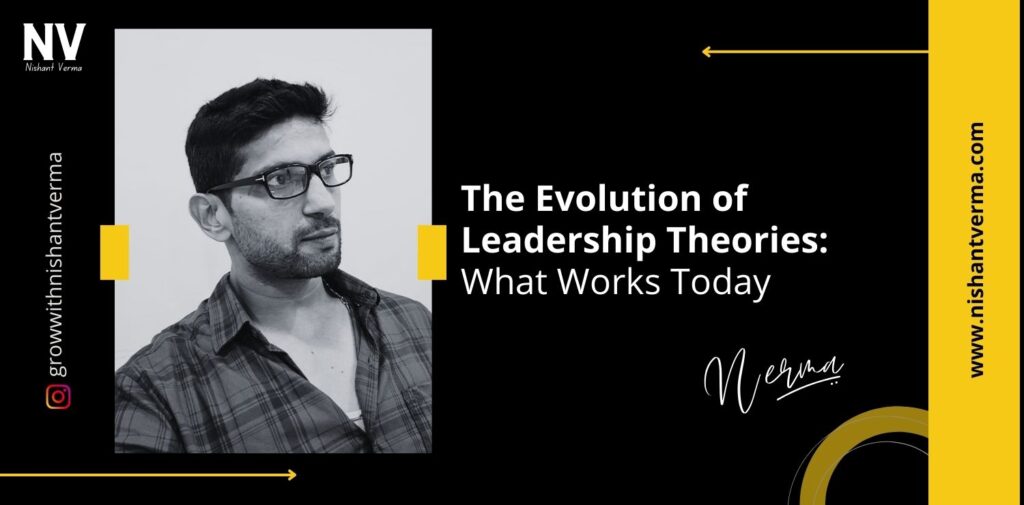Leadership is like guiding a group and showing the way forward. Over time, different ideas about Evolution of Leadership theories have emerged, each offering unique insights into what makes a good leader. In this article, we’ll explore the evolution of leadership theories in simple language. We’ll discuss the key ideas that have shaped our understanding of Leadership and explore what works in Leadership today.

Understanding Leadership: A Guide on the Journey
Leadership is about guiding a group toward a common goal. A leader inspires, makes decisions, and helps the team move forward. But what makes a leader effective? This question has led to the development of various Evolution of Leadership theories over the years.
The Great Man Theory: Born to Lead?
The Great Man Theory, one of the earliest ideas about Evolution of Leadership theories, suggested that leaders are born, not made. According to this theory, certain individuals possess inherent qualities that make them natural leaders. While this idea might sound appealing, it overlooks that Leadership can be developed and learned over time.
Trait Theory: Identifying Leadership Qualities
Building upon the Great Man Theory, the Trait Theory focuses on identifying traits that make someone a good leader. Traits like confidence, decisiveness, and intelligence were key indicators of effective Leadership. However, research showed that these traits alone don’t guarantee success, as the context and followers influence leadership.
Behavioral Theories: Evolution of Leadership theories
Behavioral theories shifted the focus from inherent traits to the actions and behaviors of leaders. Researchers explored how different leadership styles and behaviors influenced outcomes. The two primary behavioral styles identified were task-oriented (focusing on getting the job done) and people-oriented (emphasizing relationships and team dynamics). This theory recognizes that effective Evolution of Leadership theories involves a combination of behaviors based on the situation.
Contingency Theories: It Depends on the Situation
Contingency theories expanded on the idea that effective Leadership depends on the situation. The famous Contingency Model by Fred Fiedler suggested that a leader’s effectiveness depends on the match between their Evolution of Leadership theories style and the situation. For example, a task-oriented leader might be more effective in a structured environment, while a people-oriented leader might excel in a more dynamic setting.
Transactional and Transformational Leadership: Inspiring Change
Transactional and Transformational Leadership theories brought new perspectives to the table. Transactional leaders focus on exchanges with followers, using rewards and punishments to motivate. On the other hand, transformational leaders inspire and motivate by creating a vision and fostering a sense of purpose. Transformational Leadership, emphasizing charisma and vision, has gained popularity for its ability to inspire positive change.

Servant Leadership: Putting Others First
Servant Leadership flips the traditional leadership model, emphasizing serving others. A servant leader prioritizes the well-being and growth of their team members. This approach fosters a culture of collaboration and empowerment, where leaders act as facilitators for their team’s success.
Authentic Leadership: Leading with Integrity
Authentic Leadership focuses on leaders being true to themselves and their values. This theory suggests that authentic leaders who are transparent, and genuine leaders build trust with their teams. Authentic leaders lead with integrity, creating an environment where open communication and honesty are valued.

Adaptive Leadership: Navigating Change
In today’s rapidly changing world, Adaptive Leadership has gained prominence. This theory recognizes that leaders must adapt to new challenges and guide their teams through change. Adaptive leaders are flexible, encouraging innovation and learning from successes and failures.
What Works Today: A Blend of Approaches
In the dynamic landscape of Evolution of Leadership theories, what works today is often a blend of different approaches. Effective leaders recognize the strengths of various theories and adapt their leadership style based on their team’s situation and needs. Here are some key principles that work in today’s leadership landscape:
Emotional Intelligence: Understanding and Managing Emotions
Emotional Intelligence (EI) has become a cornerstone of effective Leadership. Leaders with high EI understand and manage their emotions and the emotions of others. This skill enhances communication, empathy, and relationship-building within teams
Adaptability: Navigating Change with Agility
The ability to adapt is crucial in today’s fast-paced world. Leaders who embrace change, encourage innovation, and adapt their strategies to evolving circumstances are likelier to succeed. Adaptive Evolution of Leadership theories principles resonate well in dynamic environments.
Collaboration and Inclusivity: Fostering Team Unity
Leadership today is about collaboration and inclusivity. Effective leaders value diverse perspectives, create inclusive environments, and foster teamwork. Collaborative Leadership promotes a sense of belonging and encourages the exchange of ideas.
Servant Leadership Values: Putting Others First
Servant Leadership principles remain relevant today. Leaders who prioritize the well-being and development of their team members create a positive and empowered work culture. Putting others first builds trust and loyalty within the team
Authenticity: Leading with Integrity and Transparency
Authentic Leadership is valued in the modern workplace. Leaders who are genuine, transparent, and true to their values inspire trust and commitment. Authenticity fosters open communication and strengthens the leader-follower relationship.
Continuous Learning: A Growth Mindset
Leadership is an ongoing journey of learning and growth. Leaders who embrace a growth mindset, continuously seek new knowledge, and encourage a learning culture within their teams are better equipped to navigate challenges and drive success.
Communication Skills: The Power of Effective Communication
Communication remains a cornerstone of effective Leadership. Leaders who communicate, listen actively and foster open dialogue create an environment where information flows freely, and team members feel heard and valued.
Balancing Task and People-Oriented Approaches
Balancing task-oriented and people-oriented approaches is essential. Effective leaders recognize the importance of achieving goals while building positive relationships within the team. A balanced leadership style contributes to both productivity and team satisfaction.
Conclusion: The Ever-Evolving Journey of Leadership
Evolution of Leadership theories is a dynamic journey that evolves. Theories and approaches may come and go, but certain principles stand the test of time. Today’s effective leaders are adaptable, emotionally intelligent, and value collaboration and inclusivity. They draw from various leadership theories, blending approaches to meet the unique challenges of their roles.
As we navigate the ever-evolving Leadership, we must recognize that Evolution of Leadership theories is not a one-size-fits-all concept. What works today is a combination of timeless principles and contemporary insights. Today’s leaders can guide their teams toward success in an ever-changing world by staying open to learning, embracing change, and leading with authenticity and empathy.




